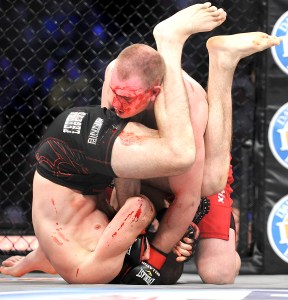Don’t let anybody mislead you, young, aspiring mixed martial artists.
Whether you pursue the sport with all your heart, soul and might, or merely dabble in it, you will get hurt.
It might be your shoulder being wrenched or collar bone getting cracked in an otherwise routine grappling workout.
“I hurt it pretty bad, but I wasn’t going to tell anybody,” said Brent Dillingham of Lewiston, who lost his first pro MMA fight in March after injuring his shoulder while sparring a week earlier.
Perhaps the wake-up call will be a nasty wound from repeated strikes to the bridge of your nose in your debut fight.
“With MMA, if we end up without a fight where there’s a deep gash that I’ve got to close, I call that a bad night,” said Jacob “Stitch” Duran, a world-famous cutman with Ultimate Fighting Championship. “It’s guaranteed work. You always expect the worst-case scenario. Then if nothing happens you go from there.”
Maybe your story will end with a cumulative toll of broken bones in your hands, neck and back that would make a Hollywood stuntman cringe.
But be warned and be ready, because those aches and pains will happen. Bank on it.
“Arthritis in my right hand. Arthritis in my right foot. Spinal arthritis,” Marcus Davis listed without a pause.
Yes, but Davis, the Houlton-born pioneer of his sport, will blow out 40 candles on his next birthday. We all get there.
Right?
“Impingement in my right shoulder. Arthritis in my right shoulder,” he continued. “Bulging disks in C5, C6, C7 and C8 (neck) and a whole list of other problems.”
Wait a minute. Other problems? Aren’t we running out of parts?
“I’ve had my face sutured 99 times. Going for the big 100. They’ve clamped my whole face shut many, many times,” Davis said. “I’ve had experimental surgery, collagen injections so I wouldn’t cut so much. That worked for a while. Now I cut as badly as ever, but it doesn’t bother me.”
For all the resounding punches and kicks, oxygen-depriving chokes and submission holds that threaten to twist limbs like pretzels, the injury toll of mixed martial arts is relatively comparable to that of traditional team sports.
In a five-year study by Johns Hopkins University, one that followed 1,270 athletes into the cage, less than one-quarter of them sustained a documented injury in those fights.
And the vast majority of those injuries were of the nuisance variety. Cosmetic damage, mostly.
“I’ve had a bunch of stitches in my face, but I was never that pretty when I started, so that’s not a big deal,” said Travis Wiuff, a veteran of 85 professional MMA fights from Minnesota.
By design, exhibitions in the mixed martial arts cage are significantly shorter than those in the boxing ring.
Rounds are five minutes instead of three, but traditional bouts consist of only three rounds. Five-round fights are reserved for world championships.
One reason boxers by trade such as Davis have made the transition to MMA is the reduced chance of long-term damage from repeated blows to the head. Countless retired professional boxers exhibit some level of CTE (chronic traumatic encephalopathy), known in the trade as “pugilistic dementia.”
Davis, who fought 20 times as a pro boxer before the switch, said that he has passed all neurological testing with ease.
“I feel great. I had a CAT scan and an MRI back in 2011, and everything was normal,” he said. “I’ve had thorough examinations, and I’m good other than the normal wear-and-tear things.”
UFC fighter Gary Goodridge was diagnosed with early-onset dementia in 2010. But Goodridge believes his 12-year career in kickboxing — in which blows to the head are frequent — is to blame, not his more brief foray into mixed martial arts.
Wiuff echoes Davis when he lists his many maladies. He cites shattered hands, screws to hold together the bones in his face, torn ligaments and chronic neck pain.
Most troubling and potentially threatening in the future to Wiuff, 35, are concussions. The number he has sustained, he said, is too many to document.
“That seems to be the hot topic right now, but I feel fine,” Wiuff said. “Things add up. I definitely don’t feel like I felt when I was 25.”
Permanently damaged hands are a hallmark symptom for veteran MMA fighters. Their gloves are lighter with significantly less padding than boxing equipment.
If your day job involves manual labor, both Davis and Wiuff are cautionary tales.
Wiuff said that he has “broken every bone” in each hand “at least two or three times.” Davis’ career nearly ended in 2010 when training became nearly impossible.
“I think the arthritis started to slow me down,” Davis said. “When you can’t even hit a heavy bag with your hands completely wrapped and wearing 16-ounce gloves because it hurts so bad, you’ve got a problem.”
Davis said that a new arthritis medication alleviated the pain and resuscitated his career, one that will continue when he fights in the main event at Androscoggin Bank Colisee on May 18.
“I’m one of those guys who has been fortunate. Other than a short time from 2010 through 2012, I haven’t taken a lot of abuse,” Davis said.
Well, when compared to someone sitting at home in his recliner, anyway.
MMA: Maine’s Caged Craze
Sunday: A look at the growth of the sport in Maine and a look at the dangers.
- ‘We’re a fighting state’
- The Hot Corner: Making the change from the ring to the cage
- MMA: Did You Know?
- MMA: Still limited in some states
- By the Numbers: MMA Injuries
Coming Wednesday: The evolution of safety in the sport has helped it expand and maintain.
Coming April 28: Reasons for the sport’s popularity abound; and a look to the future.



Comments are no longer available on this story